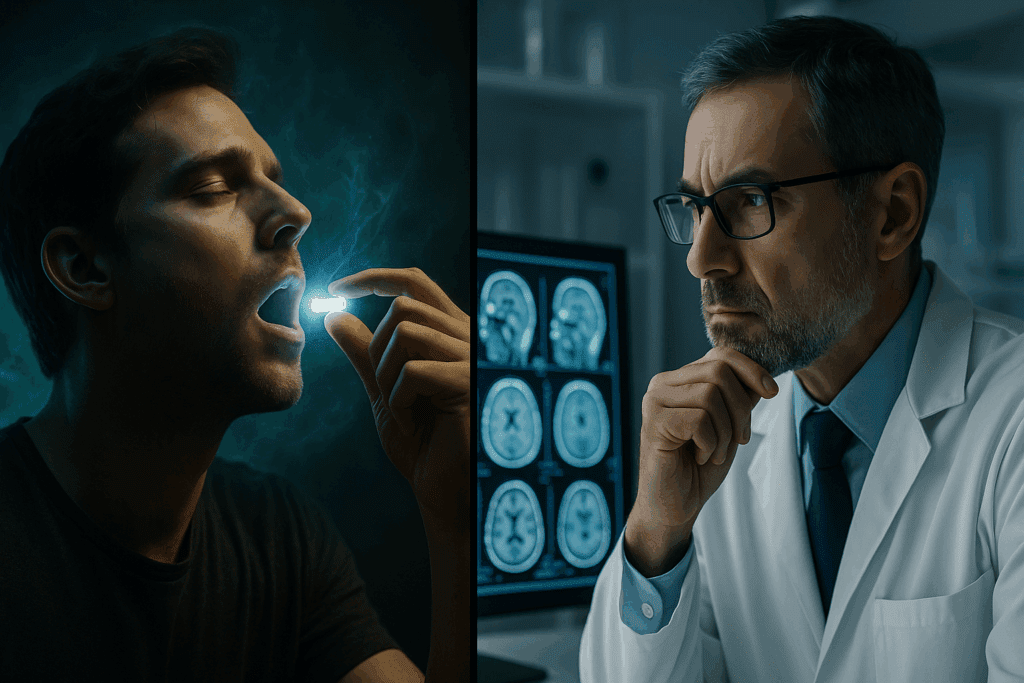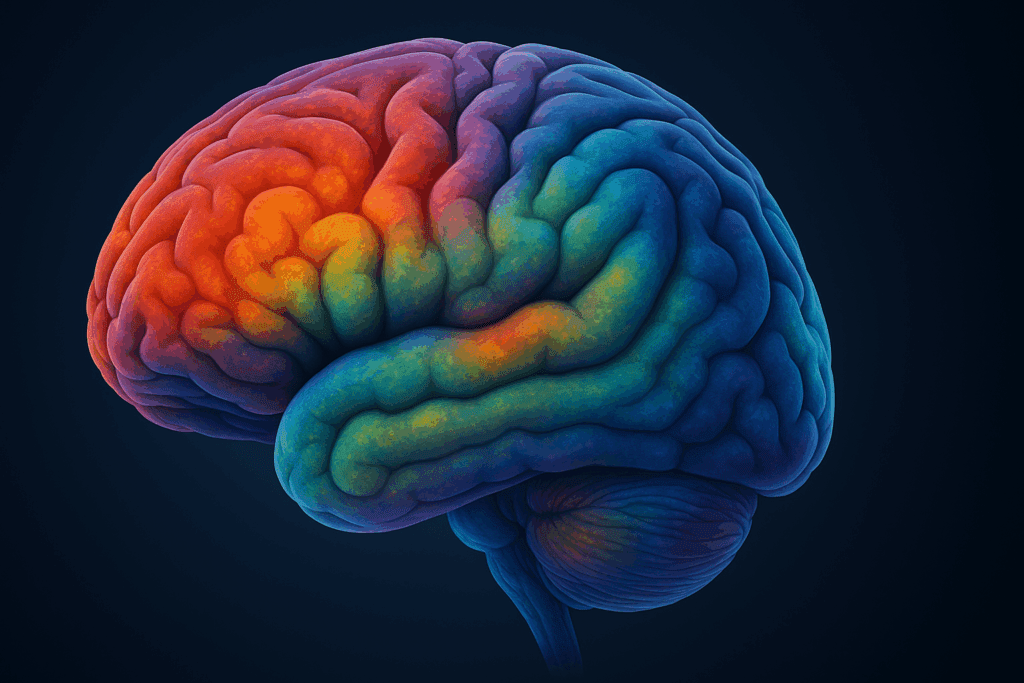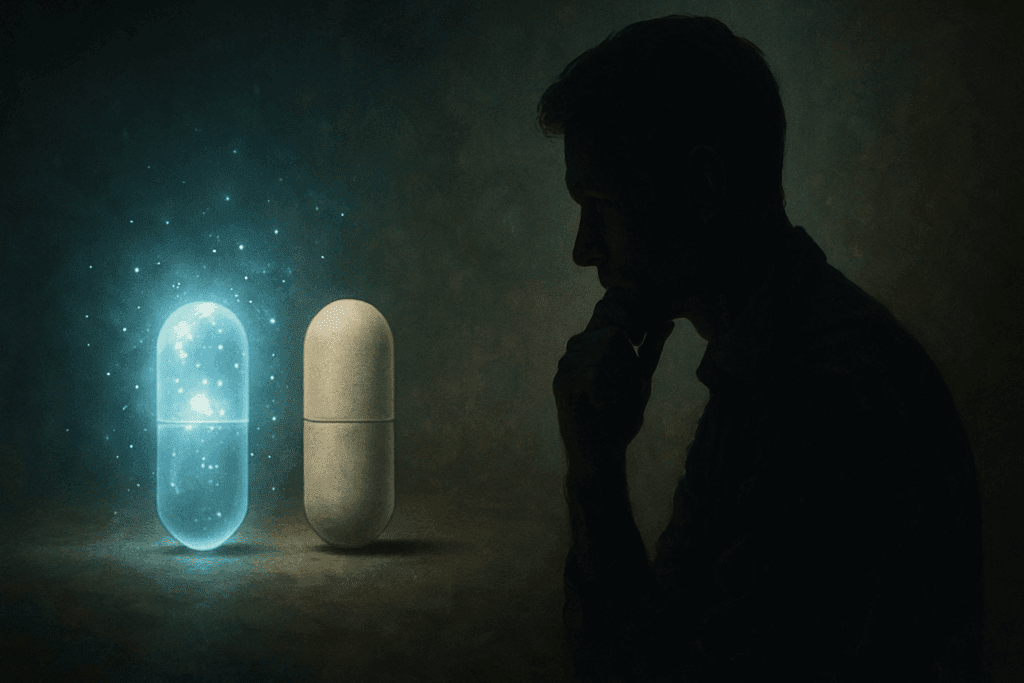The idea of unlocking 100% of the human brain has long captured the public imagination. Popularized by Hollywood in films like Limitless and Lucy, the concept suggests that somewhere, somehow, there exists a pill that can unleash the full potential of the mind. In Limitless, protagonist Eddie Morra takes a mysterious drug called NZT-48, and suddenly he is transformed—his intellect expands, his focus sharpens, and he becomes a master of finance, language, and memory. But does a real “limitless pill” exist? And if so, are we on the brink of a new era in cognitive enhancement, or are we merely indulging in modern mythology? In this comprehensive review, we explore the scientific basis for the so-called “limitless pill,” separate myth from fact, and examine the reality behind drugs that claim to unlock 100% of your brain.
You may also like: How to Choose the Best Brain Supplements for Adults: Science-Backed Ingredients That Support Focus, Memory, and Mental Clarity
The Origins of the Limitless Pill Myth
The myth of unlocking the full brain likely stems from the oft-repeated but scientifically inaccurate claim that humans only use 10% of their brain. Though debunked by neuroscientists time and again, this myth persists because it taps into a compelling narrative: the idea that we have vast, untapped mental reserves just waiting to be released. Hollywood, ever eager to amplify the extraordinary, has run with this idea in multiple storylines, crafting characters who take a single pill and ascend to god-like levels of intelligence.
This narrative gained unprecedented traction with the release of Limitless in 2011, in which Bradley Cooper’s character takes the fictitious NZT pill and becomes a polymath overnight. In the wake of the film, public interest in smart drugs, also known as nootropics, surged dramatically. Online searches for phrases like “pill that makes you use 100 percent of your brain” and “nzt pills” skyrocketed, feeding a growing market for cognitive enhancement supplements. The allure was simple yet potent: what if a pill could make you smarter, more focused, and more successful without the need for years of education or training?

Understanding Cognitive Enhancement and Nootropics
Before diving into whether a real-world counterpart to NZT exists, it’s crucial to understand the broader category into which such a pill would fall: nootropics. Nootropics are substances that aim to improve cognitive function, particularly executive functions like memory, creativity, motivation, and attention. These can be synthetic compounds like modafinil and racetams, or natural substances like caffeine, L-theanine, and ginkgo biloba.
Unlike the fictional limitless tablet name NZT-48, real-world nootropics operate within the bounds of biological plausibility. They do not grant instantaneous knowledge or superhuman intellect. Instead, they may offer incremental improvements in mental clarity or energy, depending on the individual’s baseline cognitive performance, health status, and the compound used. For example, modafinil, a drug originally developed to treat narcolepsy, has been shown in some studies to enhance attention and executive function in healthy individuals—but not to the dramatic extent portrayed in film.
The Neuroscience Behind Brain Utilization
The central myth driving the popularity of NZT pills and similar substances is the notion that humans only use a small fraction of their brains. Neuroscience, however, paints a very different picture. Functional MRI scans show that virtually every part of the brain has a known function and is active at various times. From the prefrontal cortex involved in decision-making to the cerebellum responsible for motor control, the brain is a dynamic, integrated organ that functions as a whole.
The misunderstanding may stem from the fact that at any given moment, only a subset of neurons is actively firing, depending on the task. But this does not mean the rest of the brain is dormant or unused. It simply reflects the brain’s efficiency in allocating resources. Therefore, the idea of a pill that makes you use 100 percent of your brain is based on a false premise. Enhancing the brain’s performance is not about turning on unused parts but rather about optimizing the function of existing neural networks.

NZT Pills in the Real World: What’s the Closest Equivalent?
While no real drug can replicate the effects of the fictional NZT-48, some compounds come closer than others in terms of their potential to enhance specific aspects of cognition. Modafinil, as mentioned earlier, is one of the most well-studied cognitive enhancers available by prescription. It promotes wakefulness and can lead to improved attention and alertness without the jitteriness associated with stimulants like amphetamines.
Another promising category is racetams, such as piracetam and aniracetam. These compounds are believed to modulate neurotransmitters like acetylcholine and glutamate, which are essential for learning and memory. However, the evidence supporting their effectiveness is mixed, and they are not FDA-approved for cognitive enhancement in the United States. Natural nootropics, including bacopa monnieri, rhodiola rosea, and Panax ginseng, are also popular among users seeking subtle improvements without pharmaceutical intervention. These natural options may not rival a pill that makes you use 100 percent of your brain, but they do offer some support for mental stamina and clarity.
Despite these developments, it’s important to underscore that no compound currently available on the market matches the rapid, broad-spectrum cognitive enhancement depicted in Limitless. Any product marketed as a true limitless pill review should be approached with skepticism unless backed by robust, peer-reviewed research.
The Role of Placebo and Expectation in Perceived Benefits
One often-overlooked factor in the limitless pill debate is the placebo effect. The power of belief in a substance’s efficacy can itself lead to measurable changes in performance. Studies have shown that when individuals believe they are taking a cognitive enhancer, they may experience boosts in motivation, focus, and confidence—even if the substance is inert.
This psychological component is critical to understanding why some users claim dramatic effects from taking what are essentially glorified vitamin stacks. If someone takes a supplement they believe to be one of the latest drugs that unlock 100 of your brain, the expectation of improvement alone may influence their behavior in a way that mimics actual enhancement. This doesn’t negate the value of nootropics, but it does emphasize the importance of objective, controlled research in evaluating their true impact.
Decision-Making Optimization: The Real Power of Smart Drugs?
One of the most promising, and perhaps underrated, benefits of certain nootropics lies in their capacity to support decision-making. High-pressure environments like finance, medicine, and military operations demand rapid yet accurate cognitive performance. Here, modest gains in alertness, working memory, or stress resilience can yield significant practical advantages.
Unlike the dramatized effects seen in fictional portrayals of NZT pills, the actual benefits often relate to more focused attention, reduced fatigue, and improved executive control—skills essential for navigating complex decisions. For instance, executives who rely on modafinil have reported being able to manage longer hours of deep work with sustained concentration. In this context, the idea of a limitless tablet name may not be far off in metaphor if one considers the real-world benefit of making better decisions under pressure.
Even caffeine and L-theanine, a combination frequently touted in smart drug circles, have shown evidence of improving task-switching and mental alertness. These enhancements don’t equate to genius-level intellect, but they do optimize decision-making processes in meaningful ways, especially when paired with healthy lifestyle habits.

Cognitive Enhancement in Academic and Professional Settings
In academia, cognitive enhancers have stirred considerable ethical debate. Surveys suggest a growing number of college students are experimenting with off-label use of prescription stimulants to gain a competitive edge. This trend has raised questions about fairness, safety, and long-term consequences.
It’s critical to distinguish between enhancement and treatment. Using ADHD medication to compensate for a diagnosed condition is medically justified. However, when healthy individuals seek these drugs as a shortcut to excellence, the line between therapeutic use and performance enhancement blurs. What’s more, many of these substances carry risks of dependence, cardiovascular strain, and mood disturbances—an important consideration for anyone tempted by the dream of the limitless pill.
Professionals in high-stakes fields are also increasingly drawn to these cognitive enhancers, especially as productivity expectations continue to escalate. While some users report tangible benefits, the reality remains that most nootropics offer only moderate improvements, and their long-term safety profiles are not well understood. For those pursuing a pill that makes you use 100 percent of your brain, the current scientific consensus advises caution, not only because such a pill doesn’t exist, but because the pursuit itself can lead to misuse and disappointment.
Ethical and Legal Implications of Cognitive Enhancement
The growing popularity of cognitive enhancers has prompted ethical questions regarding autonomy, coercion, and inequality. If certain professions begin to view these substances as necessary tools for success, it could create pressure for individuals to use them just to remain competitive, rather than for genuine personal development.
Moreover, disparities in access to these drugs may exacerbate existing socioeconomic divides. If only those who can afford premium nootropics or have access to medical prescriptions can enjoy their benefits, the result may be an uneven playing field—contradicting the democratic ideals of education and meritocracy. Legal frameworks around cognitive enhancers are also evolving, with some countries tightening regulations to prevent misuse.
This ethical landscape adds a sobering counterweight to the enthusiasm surrounding nzt pills and other smart drugs. While the promise of improved performance is seductive, it is crucial to weigh that promise against the broader social and personal consequences of widespread cognitive enhancement.

Standalone FAQ: Exploring the Realities Behind the “Limitless Pill” Concept
1. Is there any real-world version of the “limitless tablet name” from the movies?
While there isn’t a drug that functions exactly like the fictional “limitless tablet name” seen in Hollywood, researchers have explored various compounds that enhance cognitive performance in more nuanced ways. Nootropics like modafinil, racetams, and L-theanine are often compared to the limitless pill concept but with far subtler effects. These substances may improve memory, focus, or alertness temporarily, especially under sleep-deprived conditions, but they don’t unlock hidden reservoirs of intelligence. Clinical studies on these compounds typically show modest improvements at best, and results often vary depending on the user’s baseline cognitive state. Unlike the dramatic transformation depicted in films, real cognitive enhancers work incrementally and require responsible use over time.
2. How do “nzt pills” compare to existing nootropics on the market today?
“Nzt pills” are fictional, but they’ve inspired a wave of curiosity about drugs that could supercharge the brain. Compared to real nootropics, nzt pills are a hyperbolic fantasy: they promise instant genius, photographic memory, and boundless energy. In contrast, nootropics in today’s market tend to target specific functions—like enhancing short-term memory, reducing mental fatigue, or improving attention span. These benefits usually emerge after regular use and vary greatly between individuals. Additionally, unlike nzt pills, legitimate nootropics are constrained by real-world biochemistry and safety regulations, making the comparison more imaginative than practical.
3. Are there any safe ways to simulate the effects of the “pill that makes you use 100 percent of your brain”?
The idea of a pill that makes you use 100 percent of your brain is based on a widely debunked myth—humans already use all parts of their brain, just not all at once. However, simulating a heightened cognitive state is possible through a combination of evidence-based strategies. These include deep work techniques, structured cognitive training, sleep optimization, and strategic nootropic use under medical supervision. Some users also report benefits from practices like neurofeedback, mindfulness, and even intermittent fasting. When combined thoughtfully, these methods can create a synergistic effect that mimics the alertness and mental clarity often associated with the so-called limitless pill.
4. What are the long-term psychological implications of using cognitive enhancers like the “limitless pill”?
Long-term use of cognitive enhancers—especially unregulated or off-label ones—raises concerns that extend far beyond the initial cognitive boost. Psychological dependence is a growing issue; users may begin to feel ineffective without these aids, creating a self-imposed ceiling on natural performance. There’s also the risk of burnout, especially if these substances are used to push through chronic sleep deprivation or high-stress environments. Over time, some users report increased anxiety, irritability, or even depressive episodes during withdrawal periods. Unlike the “limitless pill” narrative, which celebrates constant peak performance, real human brains need recovery and balance to thrive sustainably.
5. How do societal expectations impact the pursuit of drugs that unlock 100 of your brain?
Society’s increasing demand for productivity and competitiveness has fueled interest in drugs that unlock 100 of your brain, even if the concept itself is scientifically flawed. In high-pressure industries—like tech, finance, or academia—there’s a subtle but pervasive expectation to be cognitively superior. This often leads individuals to experiment with enhancers without adequate medical guidance. The result is a cultural shift toward pharmacological solutions for performance, rather than holistic ones like time management or mental wellness. This trend reflects not just personal ambition but societal norms that prioritize output over well-being.

6. How accurate are most “limitless pill review” posts online?
Many limitless pill review articles online are either heavily biased, promotional, or based on anecdotal experiences rather than peer-reviewed science. Often, these reviews are created by affiliate marketers with a vested interest in selling a product, which compromises their objectivity. A trustworthy limitless pill review should cite clinical studies, address both short- and long-term effects, and disclose any potential conflicts of interest. It’s also essential to distinguish between FDA-approved substances and unregulated supplements that may contain undisclosed or harmful ingredients. Consumers should approach these reviews critically and consult healthcare professionals before acting on any claims.
7. Are tech entrepreneurs and executives really using these kinds of cognitive enhancers?
Yes, reports suggest that a growing number of tech entrepreneurs, startup founders, and executives are experimenting with nootropics in pursuit of a competitive edge. These individuals often work long hours under intense pressure, making cognitive efficiency a perceived necessity. Some use racetams or microdosed psychedelics, while others combine caffeine, L-theanine, and noopept in customized “stacks.” The culture around these enhancers is often secretive, but forums and underground communities openly share formulations, routines, and even limitless pill review-style testimonials. However, long-term efficacy and safety remain under-studied, and anecdotal success doesn’t equate to universal benefit.
8. What role does placebo play in the perceived effects of the “limitless tablet name” and similar nootropics?
The placebo effect plays a significant and often underappreciated role in the perceived effectiveness of cognitive enhancers like the so-called limitless tablet name. When users believe a pill will enhance their performance, they may unconsciously put in more effort, focus harder, and experience increased motivation—regardless of the pill’s actual contents. This psychological boost can sometimes rival or even surpass the effects of the active ingredients themselves. In clinical trials, many nootropics show a high placebo response, indicating that user expectation is a powerful cognitive tool. Recognizing this can help consumers better evaluate whether they’re truly benefiting from a substance or merely experiencing a belief-driven high.
9. Could the “pill that makes you use 100 percent of your brain” be a metaphor rather than a medical goal?
Absolutely—it’s more useful to see the pill that makes you use 100 percent of your brain as a metaphor for untapped potential than a literal pharmaceutical achievement. In reality, the human brain is already highly efficient, and optimization comes not from accessing unused areas, but from enhancing connectivity, neuroplasticity, and resilience. The metaphor encourages us to explore tools that elevate performance, such as learning strategies, emotional intelligence, and adaptability. Rather than chasing mythical brain usage thresholds, individuals might benefit more from identifying personal bottlenecks—whether they’re mental, emotional, or physical—and addressing those with customized interventions.
10. What does the future hold for nzt pills and other cognitive enhancement technologies?
The future of cognitive enhancement is likely to move beyond simple chemical pills into more integrated bio-technologies. Innovations like brain-computer interfaces, transcranial stimulation, and personalized neuropharmacology could redefine what nzt pills symbolize. Researchers are already exploring how genetic data can inform tailored nootropic regimens, and AI-driven brain mapping may soon predict the most effective interventions for each individual. These developments aim not just to enhance memory or attention, but also creativity, emotional regulation, and ethical decision-making. While the dream of a limitless tablet name remains speculative, the trajectory suggests a future where enhancement is as much about balance and personalization as it is about power.

Closing Thoughts: The Truth Behind the Limitless Pill Fantasy
In a world hungry for shortcuts and silver bullets, the idea of a limitless pill is undeniably seductive. The notion that a single capsule could unlock hidden reservoirs of genius, productivity, and success taps into our deepest desires for self-actualization. Yet science tells a more grounded story. The human brain is already an astonishingly efficient organ, with each region finely tuned to support our daily cognitive demands. There is no pill that makes you use 100 percent of your brain because you are already using it—all of it—in varying capacities depending on your actions, intentions, and mental state.
While the allure of the limitless tablet name and similar branding is understandable, the reality is that current nootropics can offer, at best, incremental improvements in focus, memory, or wakefulness. These gains may be meaningful in high-performance settings or during periods of intense mental demand, but they are not magical transformations. The best path to cognitive enhancement still lies in foundational habits: quality sleep, balanced nutrition, regular exercise, lifelong learning, and meaningful social engagement.
Those seeking a limitless pill review grounded in fact rather than fiction must turn to evidence-based evaluations, not marketing claims. A well-formulated supplement stack, tailored to individual needs and guided by clinical research, may support cognitive performance in a responsible way. But until science catches up with science fiction, true cognitive mastery remains a complex interplay of biology, environment, and willpower—not something that can be swallowed in a single, shimmering capsule.
The fantasy of drugs that unlock 100 of your brain might never fully disappear, but with education and discernment, we can make smarter choices about how we pursue mental enhancement. Whether you’re a student aiming for better focus or a professional managing cognitive fatigue, the real path to optimized brain function begins not in a laboratory, but in your daily habits, mindset, and commitment to lifelong growth.
Further Reading:
What is your review of Limitless (2011 movie)?
I Took the Limitless Pill and Here’s What Happened
An Expert Debunks the Movie Myth that A Pill Can Unlock 90 Percent of Your Brain


